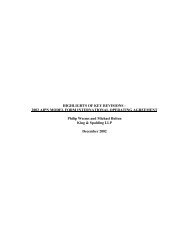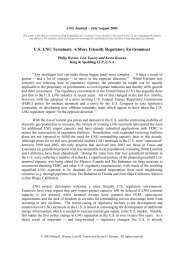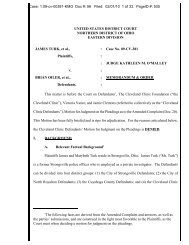Client Alert: 2012 OPDP Warning and Untitled Letters
Client Alert: 2012 OPDP Warning and Untitled Letters
Client Alert: 2012 OPDP Warning and Untitled Letters
Create successful ePaper yourself
Turn your PDF publications into a flip-book with our unique Google optimized e-Paper software.
222<strong>2012</strong> <strong>OPDP</strong> <strong>Warning</strong> <strong>and</strong> <strong>Untitled</strong> <strong>Letters</strong><br />
Date with<br />
Hyperlink<br />
to Letter<br />
Drug <strong>and</strong> Indications Referenced<br />
in Letter<br />
Boxed<br />
<strong>Warning</strong><br />
Form of<br />
Communication<br />
12<br />
Summary of Alleged Violations<br />
drug product, especially because the PI contains a <strong>Warning</strong> <strong>and</strong> Precaution<br />
regarding gastrointestinal disturbances.<br />
Omission of Material Facts:<br />
o Brochure omits important information regarding the required course of<br />
action in the event that a patient vomits after administration of the drug.<br />
o Brochure suggests that Zmax demonstrates similar efficacy when<br />
compared to a wide array of antibiotics when this is not supported by<br />
substantial evidence or experience.<br />
Broadening of Indication:<br />
o<br />
Brochure implies that Zmax is indicated to treat types of infections other<br />
than acute bacterial sinusitis <strong>and</strong> community-acquired pneumonia by using<br />
the word, “including,” after “certain infections” when Zmax is indicated to<br />
treat specific conditions.<br />
o Totality of brochure presentation suggests that Zmax is approved to treat<br />
any conditions associated with a list of symptoms, including viral<br />
infections that cause influenza or the common cold, when this has not been<br />
demonstrated <strong>and</strong> the PI states that Zmax only works against bacteria.<br />
Unsubstantiated Superiority Claim:<br />
o<br />
Claims suggest that Zmax is clinically superior to other antibiotics because<br />
of its “1 day, 1 dose” dosage regimen, but clinical studies only<br />
demonstrated that Zmax was non-inferior to other dosage regimens for<br />
other antibiotics, so the claim is not supported by substantial evidence.<br />
Misleading Efficacy Claims:<br />
o<br />
Brochure presentation misleadingly suggests that Zmax demonstrates<br />
clinically significant efficacy for a period of time not demonstrated in<br />
clinical trials. Clinical trials included evaluations 7 to 14 days post<br />
treatment, but because Zmax is only administered one time as a single<br />
dose, it is unclear exactly how long the extent of the therapeutic benefit is<br />
maintained, so suggestion that the clinical effect lasts for 10 days following<br />
administration is misleading.<br />
Unsubstantiated Claims:<br />
o<br />
o<br />
Claims suggest that adult patients <strong>and</strong> parents of pediatric patients would<br />
take Zmax again if they were to have the same infection, but the telephone<br />
survey responses used to support the claim are not sufficient support for<br />
the outcomes claimed because the survey cannot adequately assess all<br />
factors that may influence decisions to take any particular treatment again.<br />
Claim suggests that treatment is “much easier” to complete as compared to<br />
other antibiotic products, but the question used to support this claim is not<br />
sufficient because it does not assess whether the effects of the drug,

















